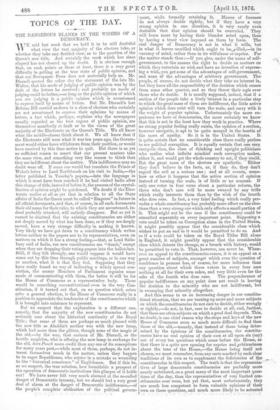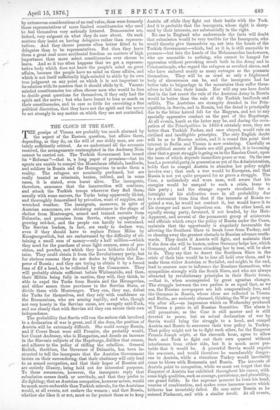TOPICS OF THE DAY.
THE DANGEROUS BLANKS IN THE WISHES OF A DEMOCRACY.
WE said last week that we held it to be still doubtful what view the vast majority of the electors take, or whether-they take any decided view, as to the question of the Queen's new title. And certainly the week which has since elapsed has not cleared up the doubt. It is obvious enough that, on such points as these at least, there is a very great difficulty in getting at the true state of public opinion, and that our Newspaper Press does not materially help us. Mr. Disraeli quoted the other day the statement of the late Mr. Walter, that his mode of judging of public opinion was by the drift of the letters he received ; and probably no mode of judging could be better,—so long as the public opinion of which you are judging is a public opinion which is accustomed to express itself by means of letters. But Mr. Disraeli's last Reform Bill carried us down to a class of electors who certainly are not accustomed to express their opinions by means of letters, a fact which, perhaps, explains why the newspapers usually regarded as the best organs of public opinion, are themselves manifestly at fault as to the views of the great majority of the Electorate on the Queen's Title. We all know what the middle-classes think about it. We all know that if the Electorate still were what it was ten years ago, the Govern- ment would either have withdrawn from their position, or would have received by this time notice to quit. But there is as yet no sufficient reason to assert that our present masters take the same view, and something very like reason to think that they are indifferent about the matter. This indifference may no doubt wear off. If some one would but translate the Prince of Wales's letter to Lord Northbrook on his visit to India,—the letter published in Tuesday's papers,—into the language in which it must have been couched if he had visited India after this change of title, instead of before it, the process of the crystal- lisation of opinion might be quickened. We doubt if the Elec- torate realise at all as yet that in relation to all the State affairs of India the Queen must be called "Empress" in future in all official documents, and that, of course, in all such documents their old name for their ruler, to which they are accustomed, in- deed probably attached, will entirely disappear. But as yet it cannot be doubted that the existing constituencies are either not deeply moved by what has been done, or if they are deeply moved, have a very strange difficulty in making it known. Very likely we have got down to a constituency which writes letters neither to the papers nor to its representatives, even on matters on which it has a strong feeling,—that, as Lord Salis- bury said of India, our new constituencies are "dumb," except when they are dropping their voting-papers into the ballot-box. Still, if they felt strongly, one would suppose it would haVe come out by this time through public meetings, or in one way or another, what it is that they feel. Supposing that they have really found no way of indicating a widely spread con- viction, the sooner Members of Parliament organise some mode of communicating with them, the better it will be for the House of Commons as a representative body. There would be something unconstitutional even in the very Con- stitution, if it turned out that, on no question which arises after a general election, is the House of Commons really in a position to appreciate the tendencies of the constituencies which it is brought into existence to represent.
But we suspect that the explanation is a different one, namely, that the majority of the new constituencies do not seriously care about the historical continuity of the Royal Title ; that some of them are perhaps as much pleased with the new title as Aladdin's mother was with the new lamp, which had more than the glitter, though none of the magic of the old,—by the way, that cartoon of Mr. Disraeli, as the hostile magician, who is offering the new lamp in exchange for the old, does Punch more credit than any one of its conceptions for many years past,—while most of them, perhaps, do not in-. Wrest themselves much in the matter, unless they happen to be eager Republicans, who rejoice in a mistake so wounding to the " historical conscience " of Englishmen. But if this be, as we suspect, the true solution, how formidable a prospect of the operation of democratic institutions this glimpse of it holds out! We have never felt very much alarmed at the so-called danger of Democratic tyranny, but we should feel a very great deal of alarm at the danger of Democratic indifference,—of the people's complete--abdication of the political govern- ment, while formally retaining it. Masses of freemen' do not always decide rightly, but if they have a very strong opinion in one direction, it is very rarely evert desirable that that opinion should be overruled. They will learn more by having their blunder acted upon, than- by having a truer view imposed on them by force. The real danger of Democracy is not in what it wills, but in what it. leaves unwilled which ought to be,4frilled,—in its. vacancy of mind, rather than in its wilfulness or caprice. For the matter stands thus :—If you give, under the name of self- government, to the masses the right to decide on matters on- which they entertain no wish and have no intention of express- ing a Irish, you get none of the advantages of self-government, and none of the advantages of arbitrary government. The- people, of course, do not decide what they take no interest in, but they have all the responsibility of the decision which comes from some other quarter, and so they throw their aegis over those who do decide. It is usually supposed, indeed, that if section of the people take a lively interest in a particular step to which the great mass of them are 'indifferent, the little active opinion which does exist will turn the scale, and carry with it the weight of popular opinion. Unfortunately the more ex- perience we have of democracies, the more certainly we know- that this is not in the least how they work in practice. Where- no strong popular feeling really exists, the opinion of a section, however energetic, is apt to be quite merged in the inertia of the mass of apathy. So it is in the United States. It is quite certain that no considerable class there really prefers. to see political corruption. It is equally certain that one very, energetic class, the class of thinking and upright politicians who realise what infinite mischief such corruption makes, abhor it, and would get the whole country to act, if they, could.. But the great mass of the electors are apathetic. Either they don't believe in the facts, or, if they do, they don't regard the evil as a serious one ; and at all events, some- how or other it happens that the active section of opinion- instead of turning the scale, is of little or no aee,onnt. If only one voter in four cares about a particular reform, the three who don't care will be more swayed by any trifle which really interests them than by the wish of the fourth who does care. In fact, a very faint feeling which really per- vades a whole constituency has probably more effect on the elec- tions than a very strong one which only affects a small portion of it. This might not be the case if the constituency could be consulted separately on every important point. Supposing a vote could be taken on Corruption alone in the United States,. it might possibly appear that the considerable class which wishes to put an end to it would be permitted to do so. And so if a vote could be taken on the Royal Titles Bill alone- in England, it might possibly appear that the considerable class which detests the change, as a breach with history, would be permitted to veto it. That, however, can never be. When- ever an appeal to the constituencies comes, it is an appeal on a great number of subjects, amongst which even the question of _ confidence in persons has, of course, far more influence than any question about which three voters in every four care nothing at all for their own sakes, and very little even for the sake of the fourth who does care. The preponderance of popular indifference on any point does not result in leaving the decision to the minority who are not indifferent, but in swamping that minority altogether. And this seems to us an increasing danger in our constitu- tional situation, that we are turning up more and more subjects on which the constituencies do not care to decide, either wrongly or rightly,—do not, in fact, care to decide at all, and, further, that these are often subjects on which a good deal depends. This, no doubt, is one chief reason why the stops and keys of the new House of Commons seem so much more difficult to find than those of the old,—namely, that instead of these being deter- mined by the opinions of the constituencies, the constitu- encies have no real opinion of their own at all upon six (say) out of every ten questions which come before the House, se that there is a quite new opening for caprice and iirbitrariness about the tone of the House,—the House being itself not chosen, we must remember, from any caste marked by such clear traditions of its own as to supplement the deficiencies of the constituencies in this respect. The truth is that the representa- tives of large democratic constituencies are probably more nearly unfettered, on a great many of the most important ques- tions of the day, than the representatives of very limited con- stituencies. ever were, but yet that, most unfortunately, they are much less competent to form valuable opinions of their own on these questions, and much more likely to be actuated by extraneous considerations of no real value, than were formerly those representatives of more limited constituencies who used to feel themselves very seriously fettered. Democracies are, indeed, very exigeant on what they do care about. On such matters they insist on having delegates rather than represen- tatives. And they choose persons often better fitted to be delegates than to be representatives. But then they leave them a great deal more accidental freedom on matters of high importance than more select constituencies ever choose to leave. And so it too often happens that we get a represen- tative body which does not know the people's mind on great affairs, because the people have no mind on those affairs, and which is not itself sufficiently high-minded to abide by its own true judgment on any point on which it is not important to its relation with its masters that it should abide by it. Vacant- minded constituencies too often choose men who would be free to decide great questions for themselves, if they only had the spirit and the nerve ; but who have learnt to lean so much on their constituencies, and to care so little for exercising a fine political discretion, that they have not the spirit and the nerve to act strongly in any matter on which they are not controlled.



































 Previous page
Previous page